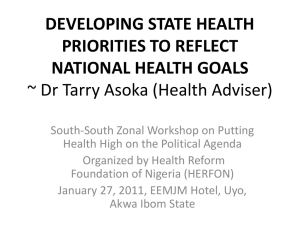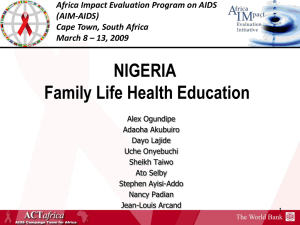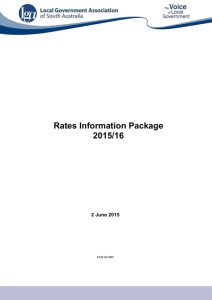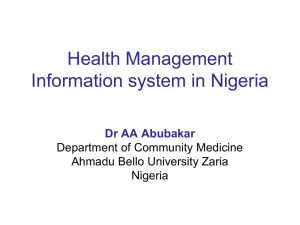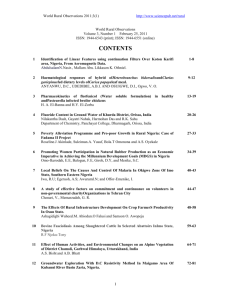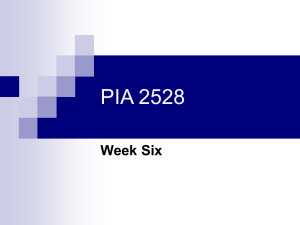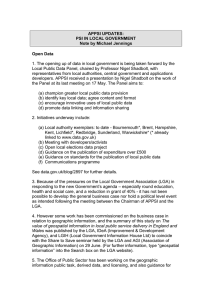Grassroot Democracy and the Challenges of Rural Development
advertisement
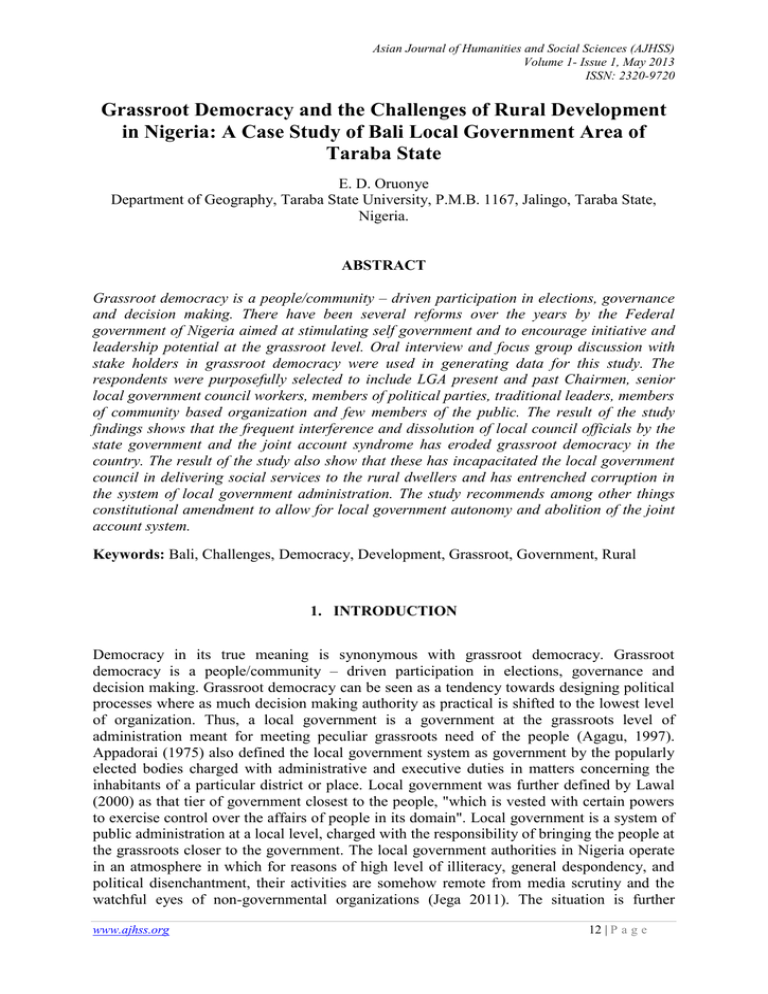
Asian Journal of Humanities and Social Sciences (AJHSS) Volume 1- Issue 1, May 2013 ISSN: 2320-9720 Grassroot Democracy and the Challenges of Rural Development in Nigeria: A Case Study of Bali Local Government Area of Taraba State E. D. Oruonye Department of Geography, Taraba State University, P.M.B. 1167, Jalingo, Taraba State, Nigeria. ABSTRACT Grassroot democracy is a people/community – driven participation in elections, governance and decision making. There have been several reforms over the years by the Federal government of Nigeria aimed at stimulating self government and to encourage initiative and leadership potential at the grassroot level. Oral interview and focus group discussion with stake holders in grassroot democracy were used in generating data for this study. The respondents were purposefully selected to include LGA present and past Chairmen, senior local government council workers, members of political parties, traditional leaders, members of community based organization and few members of the public. The result of the study findings shows that the frequent interference and dissolution of local council officials by the state government and the joint account syndrome has eroded grassroot democracy in the country. The result of the study also show that these has incapacitated the local government council in delivering social services to the rural dwellers and has entrenched corruption in the system of local government administration. The study recommends among other things constitutional amendment to allow for local government autonomy and abolition of the joint account system. Keywords: Bali, Challenges, Democracy, Development, Grassroot, Government, Rural 1. INTRODUCTION Democracy in its true meaning is synonymous with grassroot democracy. Grassroot democracy is a people/community – driven participation in elections, governance and decision making. Grassroot democracy can be seen as a tendency towards designing political processes where as much decision making authority as practical is shifted to the lowest level of organization. Thus, a local government is a government at the grassroots level of administration meant for meeting peculiar grassroots need of the people (Agagu, 1997). Appadorai (1975) also defined the local government system as government by the popularly elected bodies charged with administrative and executive duties in matters concerning the inhabitants of a particular district or place. Local government was further defined by Lawal (2000) as that tier of government closest to the people, "which is vested with certain powers to exercise control over the affairs of people in its domain". Local government is a system of public administration at a local level, charged with the responsibility of bringing the people at the grassroots closer to the government. The local government authorities in Nigeria operate in an atmosphere in which for reasons of high level of illiteracy, general despondency, and political disenchantment, their activities are somehow remote from media scrutiny and the watchful eyes of non-governmental organizations (Jega 2011). The situation is further www.ajhss.org 12 | P a g e Asian Journal of Humanities and Social Sciences (AJHSS) Volume 1- Issue 1, May 2013 ISSN: 2320-9720 worsened by the constitution of the federal republic of Nigeria which places the local government authorities under the crippling and domineering influence of the state governments that are only willing to concede limited autonomy to this tier of government. Thus, the Nigerian Local Government system which is the third tier of government has no interactive links with the community for which it was designed and created. This has made so many people to wonder if there is grassroot democracy in Nigeria. Though the government is located at the local level, it is run by elites who are alienated from the culture of the people (Akinola 2006). Thus the local government and the communities that ought to be partners in progress have been operating at parallel lines. This has resulted in the poor performance of the local government over the years in grassroot development. There have been several reforms over the years by the Federal Government of Nigeria aimed at stimulating self government and to encourage initiative and leadership potential at the grassroot level. The Federal government hopes that these reforms will further enshrine the principle of participatory democracy and political responsibility among all Nigerians, especially at the grassroot level (Usman 2010). The hope of the Federal government for rapid and sustained development at the grassroot have become a mirage as successive local government councils have grossly under-perform in almost all areas of their mandate. Corruption is at the rooftop as politicians and government officials display their ill-gotten wealth in flagrant opulence. This study therefore examines some of the challenges of grassroot democracy and rural development in Nigeria. 2. DEFINITION OF OPERATIONAL CONCEPT 2.1 RURAL DEVELOPMENT Rural development according to UN (1971) is the qualitative changes which are brought about within the rural populations. Rural development deals with details of the process of improving the living conditions of rural communities in such a way as to bridge the gap between these communities and their urban counterparts so as to make the rural economies self sustaining and retentive of its population which has been drifting steadily to the urban centres (Sanda 1988). Diejemaoh (1973) defined rural development as a process of not only increasing the level of per capita income in the rural areas, but also the improvement in the quality of life of the rural population measured by food and nutritional level, health, education, recreation and security. Rural development is a strategy designed to improve the economic and social life of those who live in rural areas, and for development agencies, the target is usually the rural poor. Rural development entails the process whereby those who are living in rural areas have a good standard of living (Lele 1975). Change in the living standards of rural populace in terms of their general or total way of life. Rural development actions are mainly aimed at the social and economic development of the areas. In Europe, rural development actions also integrate environmental management as a core component (Emilio et al, 2011). Rural development programs are usually top-down from the local or regional authorities, regional development agencies, NGOs, national governments or international development organizations. Rural development aims at finding the ways to improve the rural lives with participation of the rural people themselves so as to meet the required need of the rural area (Ijere 1992). www.ajhss.org 13 | P a g e Asian Journal of Humanities and Social Sciences (AJHSS) Volume 1- Issue 1, May 2013 ISSN: 2320-9720 3. DESCRIPTION OF STUDY AREA Bali LGA was created in 1976 out of the then Muri Local Authority with headquarter at Bali town. Bali LGA is roughly located between latitude 7o 30’N to 8o10’N and longitude 5o45’E to 6o15’E along the bank of river Taraba. Bali LGA is bordered to the north by Gassol, Ardo Kola and Yorro LGAs, to the east by Adamawa State, to the west by Donga LGA and to the south by Kurmi and Gashaka LGAs. Bali LGA consists of two districts namely, Bakundi and Dakka. Bali LGA is the largest LGA in Taraba State in terms of landmass area. It has a landmass of 9,319 km2. Bali LGA has a population of 208,933 (112,014 males and 96,921 females) according to the 2006 national census. The most important ethnic groups in the LGA are the Jibu, Wurbo, Itchen, Kam and the Hausa-Fulani. The most important human occupation in the area includes fishing, crop farming, livestock rearing and petty trading. 4. MATERIAL AND METHODS The survey design method was used in collecting data for this study. This involves oral interview and focus group discussion with stake holders in grassroot democracy. The respondents were purposefully selected to include LGA present and past Chairmen, senior local government council workers, members of political parties, traditional leaders, members of community based organization and few members of the public. Additional data was generated through secondary (desk) research to identify existing literature on grassroot democracy and the challenges of rural development in Nigeria. Bali LGA in Taraba State was used as a case study. The data generated was qualitatively analyzed. 5. RESULTS AND DISCUSSION The result of the interview with some of the immediate past local government Chairmen on their experiences during their tenure of office reveals that their relationship with the State Government has not and will never be healthy. This is more so given the current trend of incessant dissolution of Local Council by the State government and enthronement of Caretaker Chairmen, as well as the joint account syndrome. These two scenarios have completely eroded the principles and practice of democracy at the Local Government Areas (grassroot) and firmly entrench corruption in the system. Most of the respondents interviewed believed that it is the constitution of the Federal Republic of Nigeria that empowers the State Government to exercise control over the Local Government Councils. The Section 7(1) of the 1991 constitution of the Federal Republic of Nigeria guarantees a system of local governments by democratically elected local government councils. According to Bashir and Muhammed (2012) it further entrusted the survival of the local government councils on the shoulders of the state governments where it stated that “the government of every state shall subject to provisions of section 8 of this constitution, ensure their existence under a law which provides for establishment, structure, composition, financing and functions of such councils”. Today, the State Government have used that power to render the Local Councils ineffective and a mere appendage or extension of the State Government department instead of an independent tier of government that it was meant to be. Thus, most of the respondents argued that unless this section of the constitution which empowers the State Government to exercise control over the LGA is removed, democracy at the grassroot can never be achieved in Nigeria. Adequate provisions need to be made in the constitution of the Federal Republic of Nigeria to cater for the independent of the Local Government Council. www.ajhss.org 14 | P a g e Asian Journal of Humanities and Social Sciences (AJHSS) Volume 1- Issue 1, May 2013 ISSN: 2320-9720 Accountability is a big problem in the management of Local Government financing especially when it comes to the issue of joint account syndrome. The joint account concept was initially developed with good intention of helping the state checkmate and exercise control over the way and manner the Local Government Councils spend their allocation. With time the whole idea and concept changed completely as the State Governors began to exploit it to the detriment of the Local Councils. For example in Taraba State, the money is custody by the Bureau of Local Government and Traditional councils which is headed by a Special Adviser (SA) to the Governor on Local Government and Chieftaincy Affairs. It was formally Ministry for Local Government and Chieftaincy Affairs. Each month, the Bureau will release an amount that is sufficient enough to pay the Local Government workers salaries which is already known to the Bureau and sometimes even less. This usually makes it difficult for the local government council to meet up with payment of staff salaries. This condition is further worsened in situation where the local councils borrowed money from the banks to finance some pressing project needs in the LGA because the banks will always effect their deductions as soon as money is paid into the account. The local council will have to delay salary payment until middle of the month to enable them obtain over draft from their banks or the end of the following month. The balance after statutory deductions are left in the coffer of the Bureau so that if any of the local government area has any need to finance any project in the council area, they have to apply to the bureau stating the details of the project, the cost, purpose, benefits of the project to the community, the contractors that will handle the project among others. The bureau will then scrutinize the project proposal and then decide to approve or not to approve the request. Thus apart from payment of Local Government salary, the Local Council has no access to their statutory allocation from the Federal Government and in most cases they do not know how much (amount of money) was paid to the State Government as their statutory disbursement by the Federal Government. The money is usually lumped together and shared to the LGAs according to certain criteria which include population and landmass size. The statutory deductions from the LGA statutory allocation include that of education, Emirate council, Staff pension, Staff training and finally salaries of LGA workers. In situation where there is excess crude oil disbursement, the state through the Bureau manipulates the local government by releasing a peanut to them. For example, during the first tenure of the fourth republic in Taraba State, if an LGA excess crude oil allocation is N40million, the local government chairman will be given N4million naira which will be shared as follows; i. ii. iii. iv. The LGA Chairman himself will take (50%) The LGA Councillors will have (25%) The Directors in the LGA will share (12.5%) The remaining (12.5%) will be used by the Chairman for coverage of the bulk amount (N40 million) by producing fictitious receipts that will cover the total sum as expenditure and procurement made at the local council level (Interview 2012). The researcher made several efforts to get the statistics of the amount usually allocated to Bali LGA by the state government and the internally generated revenue to no avail. The LGA council members insist that the information was a classified type that cannot be divulge to anybody. However, the statutory allocation to Bali LGA from the Federation account for the month of March 2012 was two hundred and eighty one million, six hundred and eighty six www.ajhss.org 15 | P a g e Asian Journal of Humanities and Social Sciences (AJHSS) Volume 1- Issue 1, May 2013 ISSN: 2320-9720 thousand, six hundred and ninety seven naira, fifty seven kobo (N281,686,697.57) (OAGF 2012). Going by the report of similar studies in Jalingo metropolis, the state capital by Bashir and Muhammed (2012) the internally generated revenue (of 0.79% -2.4%) is insignificant to meaningfully support any planned development. The level of corruption in the Local Council was so much that practically nothing happens at the local government level. The above situation is further exacerbated by the unnecessary interference in the local government affairs by the State Government. It was observed that the politics of the State and LGAs is a complex one. This is because the State Governors will never want to end their tenure of office at the same time with the LGA Chairmen or while the LGA Chairmen are still in power. Hence, the Governors will always want to create a situation where the LGA Chairmen’s tenure elapse before the end of their tenure in office so that they can have the opportunity to appoint Caretaker Committee (CTC) who are loyal to them and will deliver the votes of their LGAs (to their party) in the forthcoming election. These appointed loyalists are the ones that will ensure their return back to power in the next dispensation. The Caretaker committee are given different nomenclatures such as Acting Chairman (Ag.), Transition Head, Sole Administrator etc to justify their continued existence in office. Caretaker Committee consists of the following; i. The Caretaker Chairman ii. Vice Chairman iii. Caretaker Councillors from each of the political ward (Interview 2012). The constitution of the caretaker committee is carefully done to ensure that only people who are loyal to the administration are appointed, usually people who are not literate enough to challenge certain decisions. Thus it has been observed that unless the LGA’s election is conducted by the Independent National Electoral Commission (INEC), the issue of Caretaker Committee will never seize to exist in the country. This is because each time the State Independent Electoral Commission (SIEC) submits its budget on the conduct of LGAs election to the State Government, she will complain that the amount is too much and that it hasn’t got such an amount of money to conduct the election. The State Government will then prefer to put in place Caretaker Committee instead of the elected executive chairmen as seen in Table 1. The other fact is that so long as the State Independent Electoral Commission (SIEC) conducts the election, it will never be free and fair. SIEC is a State government parastatal and takes directive from the State Governor. Starting from the party primaries to the main election, the State Government will make sure by hook or crook that only their loyalist won the election. This explains the reason why it has been observed over the years that once a political party is in control of the State government, all the LGA elected Chairmen will emerge from the same party. This is corroborated by the findings of Bashir and Mohammed11 which observed that during the 2004 Local Council elections conducted on 27th March, 2004 in Taraba state, the Peoples’ Democratic Party (PDP)(ruling party in the state) won all (100%) of the 16 chairmanship seats and 151 (91.5%) of the councillorship seats contested for in all the local governments of the state. No State Governor in Nigeria will want to lose any LGA Council Chairman position to another political party or non – loyalist. This is because the State Governors have come to regard the LGAs as their farm that will be yielding extra financial returns to the State Government coffer. Also the LGA Chairmen’s tenure of office varies from one state to another. For example in Taraba State during the first tenure of the fourth republic, the LGA’s tenure was 2 years which was later changed to 3 years. Hence all the LGA chairmen’s tenure does not start at the www.ajhss.org 16 | P a g e Asian Journal of Humanities and Social Sciences (AJHSS) Volume 1- Issue 1, May 2013 ISSN: 2320-9720 same time. Despite the fact that the country is in the fourth regime of the present political dispensation (fourth republic), the LGAs in the state have only had 3 elected LGA chairmen and 11 appointed LGA Chairmen with different nomenclatures since June 1999 as seen in Table 1. The short tenure of the appointed LGA chairmen will not in any way allow for meaningful development at the grassroot level. For example, between April 2006 and December 2006 (8 months only) Bali LGA had 3 different Council Chairmen. Table 1. Local Council Chairmen of Bali LGA since 1999 to date S/No 1 LGA Chairman Mal. Musa H. El-Wakil Dakka 2 Mal. Mohammed A. Jibril 3 Alhaji Abubakar Mahmud 4 Alhaji Isiaku I. Dewe Dakka 5 Alhaji Abubakar Mahmud 6 Alhaji JunaduM. Lau 7 Alhaji Lawal Yakubu 8 Alhaji Abubakar Mahmud 9 Alva Wari-Yaki, JP 10 Hon. Julde Bose Gazabu 11 Hon. Micah M. D. Dakka 12 Hon. Julde Bose Gazabu 13 Alhaji Abubakar Serti 14 Hon. Lawal Yakubu Summary i. ii. iii. iv. v. vi. Status Executive Chairman From June 1, 99 To 29 Aug. 02 Caretaker Chairman Caretaker Chairman Sole Administrator Sept. 3, 02 July 1, 03 Feb. 27, 04 June 30, 03 Feb. 27, 04 April 6, 04 Executive Chairman Ag. Chairman Caretaker Chairman Caretaker Chairman Sole Administrator Executive Chairman Ag. Chairman Executive Chairman Transition Head Caretaker Chairman April 6, 04 April 4, 06 April 24,06 July 4, 06 Dec. 27, 06 Dec.27, 07 April23, 09 April24, 09 Dec. 2010 Feb. 2011 April 4, 06 April 24, 06 July 4, 06 Dec. 26, 06 Dec. 27, 07 April 22, 09 Dec. 2010 Feb. 2011 Till date Total number of LGA heads since July 1998 till date (14 years) = 14 Total number of elected LGA Chairmen regime = 3 Total number of Sole Administrators = 3 Total number of Caretaker Chairmen = 5 Total number of Acting LGA Chairmen = 2 Total number of Transition Head = 1 At a particular point in time, the Local Government Chairmen in Nigeria decided to form an association (Association of Local Government of Nigeria - ALGON) that will unite them to have a common voice over the issue. The Association (ALGON) was becoming very powerful and intends to challenge the joint account syndrome, but before they knew it, the Governors formed the Governors Forum to help them maintain the status quo and perpetuate their dominance over the LGA. Today, the local government areas exist as an extension of the State Government department with no political autonomy or control over its own resources. Thus the Local Government areas are incapacitated to face the myriads of challenges facing it which includes high level of illiteracy and increasing dropout of school age children, poor medical facilities and personnel, unavailability of potable drinking water, poor road network and connectivity, poor finance, inadequate skilled workers, lack of participation and involvement of the local people and general indiscipline among the local government www.ajhss.org 17 | P a g e Asian Journal of Humanities and Social Sciences (AJHSS) Volume 1- Issue 1, May 2013 ISSN: 2320-9720 workers. The above challenges have alienated the grassroots people from enjoying social service delivery expected from the local government. 6. Conclusion This study has examined the challenges of grassroot democracy and rural development in Nigeria. The study finding shows that Bali local government area and other LGAs in Taraba state operate under the shadow of state government which treat them with disrespect. The LGAs councils could be dissolved without any notice, for no reason or any reason at all. The study finding shows that the LGAs have weak financial leverage and high level of uncertainty of tenure of office. Some of the challenges of grassroot democracy include the lack of constitutional provision that will guaranty local government autonomy, incessant interference in local government affairs by state government, the joint account syndrome, frequent dissolution of the local council by the state government and lack of free and fair elections at the grassroot. These challenges have undermined the ability of the local government council to deliver on their mandate especially in the provision of social services to the rural communities. This has resulted in the abysmal performance of the local government in achieving rural development in the country. 7. Recommendation The following suggestions are recommended; i. There is need to have an amendment in the constitution of the Federal Republic of Nigeria particularly section 7 of the 1999 constitution which place the local government under the state government. This change will include a provision that will make the Local Government areas autonomous and independent of the State Government. ii. The Local Government areas should have a well defined tenure of office for elected officials that will be taking care of by the constitution of the country. Also, the local government elections should be conducted by the National Independent Electoral Commission (INEC). This will guaranty some form of fairness in the electoral process. iii. The Joint Account system should be discontinued so that LGAs will have their statutory allocation directly from source which they should account for. References Agagu, A.A. (1997). "Local Government" In Kolawole, D. (Ed.) Readings in Political Science. Ibadan, Dekaal. Akinola, S. R. (2006). Structural Transformation and Polycentric Governance: A Constitutional GatewayTowards Nigerian Democratization. A paper presented at a working Conference on ‘‘Designing Constitutional Arrangements for Democratic Governance in Africa: Challenges and Possibilities. Indiana University, Bloomington, USA, 30 – 31 March 2006. Appadorai, A. (1975). The Substance of Politics. New Delhi, Oxford University Press. www.ajhss.org 18 | P a g e Asian Journal of Humanities and Social Sciences (AJHSS) Volume 1- Issue 1, May 2013 ISSN: 2320-9720 Bashir, A. and Muhammed, A. B. (2012). Challenges of Democratization at the Grassroots in Nigeria: Case Study of Taraba State. Research on Humanities and Social Sciences. Vol. 2 (7). Diejemaoh, V. P. (1973). ‘‘Rural Development in Nigeria; The Role of Physical Policy’’. Proceedings of the 1972 annual conference of the Nigerian Economic Society. Emilio, G. G., Jose, A. A. and Juan, C. P. (2011). The Complexity of Theories on Rural Development in Europe: An Analysis of the Paradigmatic Case of Almeria (South- east Spain). Sociologia Ruralis, Vol. 51, No. 1, pp 54 – 78. Ijere, M. O. (1992). Leading Issues in Rural Development. Enugu: ACENA Publishers Interview (2012). Oral interview with Alhaji Abubakar Mahmud, former Executive Chairman and one time Caretaker Committee Chairman of Bali LGA, Taraba State held in his residence on 17 March, 2012. Jega, A. (2011). Report of Proceedings of the National Workshop on Study of Democratization at the Grassroots in Nigeria (1999-2010) held at the Electoral Institute Conference Room, on Tuesday 1st March, 2011. Lele, U. (1975). The Design of Rural Development, Lessons from Africa. London. John Hopkins University Press. Lawal, S. (2000). "Local Government Administration in Nigeria: A Practical Approach" In Ajayi, K (Ed.) Theory and Practice of Local Government, Ado Ekiti, UNAD. Office of the Accountant General (OAGF) (2012). Summary of Gross Revenue Allocation by Federation Account Allocation Committee for the Month of February, 2012 Shared in March, 2012 (www.oagf.gov.ng) Sanda, O. (1988). ‘‘Corporate Strategy for Agricultural and Rural Development in Nigeria’’. Nigeria. Les Shyraden Limited. United Nation (1971). ‘‘Integrated Nature of Rural Development in Africa’’. Proceedings of International Conference organized by agency for Social and Economic Development, Uganda Usman, G. A. (2010). Local Government and Grassroots Democracy. Daily Independent Newspaper, 13th June, 2010. Lagos, Nigeria. www.ajhss.org 19 | P a g e
